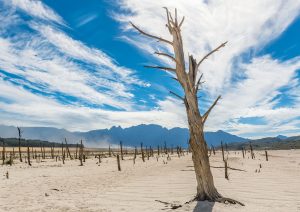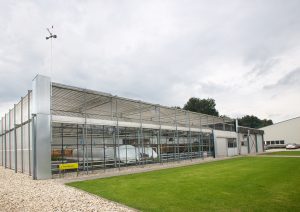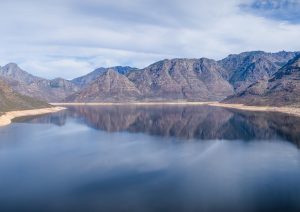
Strategic about water
Prof. Wiehann Steyn, General Manager of Hortgro Science, discusses how Hortgro takes a proactive approach to water.
The primary aim of our research strategy is to produce and market more high-quality fruit. Part of that involves mitigating risks. Climate change and water scarcity are two of our industry’s five main risks.
Extreme weather events due to climate change are one concern. But climate change is also predicted to lead to drier conditions in our part of the world. Winter rainfall will decrease. There might initially still be high rainfall against the mountains, but even that will lessen over time.
Hortgro can’t have a look-and-see attitude — we can’t wait ten years to assess the situation. By then, our industry may suffer more prolonged droughts and insufficient rainfall. We need to start working on solutions now so that our industry can cope in the future.
South Africa is already a water-scarce country, and many of our production areas are dry. We rely on water from dams, and competition for that water is increasing. We have groundwater resources, but those could easily be depleted or degraded. Injudicious management of boreholes can lead to problems such as salinisation of groundwater.
Salinisation is also going to become a bigger challenge as it gets drier. We already saw this in areas such as the Warm Bokkeveld with the drought a few years ago.
So, Hortgro must look at how to utilise our existing water sources better. We’ve commissioned a water strategy from Zutari, an infrastructure engineering and advisory company that recently completed a 15-year integrated drought and water response plan for the Western Cape Government.
We are also funding groundwater consulting company GEOSS to characterise groundwater availability and use, including recharge and run-off assessments, within the main Hortgro production areas.
Hortgro has created a position for a Sustainability and Resource Manager that will be filled in the new financial year. Among other things, this person will be responsible for implementing the water and climate change response strategies. The latter was drafted for Hortgro by a team led by Dr Stephanie Midgley, Specialist Scientist for Climate Change at the Western Cape Department of Agriculture.
The climate change response and water strategies cover far more than research, but water research is the focus of this article.
Filling the research gaps
Since 2011, research gaps have been identified by the Hortgro Irrigation and Nutrition Work Group. For example, current gaps include the effects of deficit, excessive and pulsing irrigation on sunburn and internal heat damage caused by heatwaves.
Our emphasis is on measuring water productivity. Improving irrigation and water-use efficiency is important, but the real question is how many kilograms of export fruit — how much income — can you generate from every cubic metre of water applied? As water becomes scarcer and possibly costlier, we need to think about what we do with our water.
The first step in our water research is determining how much water the different crop types require. Hortgro has been working with the Water Research Commission to fund projects on water use in high-performing fruit orchards, starting with apples, pears, and plums.
We focus on high-performing orchards because we want to calculate the optimum water use — previous research in pears showed that any irrigation shortfalls impact fruit quantity or quality.
We also have a new project under the Sustainability and Resource Management programme to mine FruitLook data to learn about water use in different crop types and cultivars in various production areas.
The next step is finding ways to save water. We’ve already researched water savings with mulch and nets. We’re now investigating low-flowrate drip irrigation. Drip irrigation under nets might have an additive effect on water saving and may allow a cover crop to grow.
Thirdly, we are assessing the effect of plant water status on fruit quality and production. Previous research established the link between water deficit and sunburn in apples and plums. A recently completed project investigated the effects of water deficits during drought on the postharvest quality of fruit.
I believe water scarcity is the most significant production risk associated with climate change. Higher temperatures can cause problems such as sunburn or reduced storability, and extreme weather events damage infrastructure and orchards. But without water, you don’t have a product — you can’t grow trees without water.
So, water will remain a big topic for Hortgro and one that we will continue researching.






